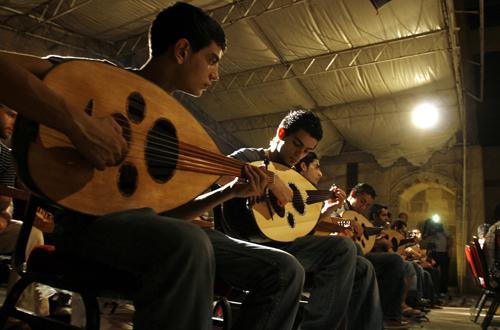Plight of fellow Iraqis shapes oud player’s music

September 15, 2008
CAIRO, Egypt – Iraqi composer Naseer Shamma is such a master of the traditional Arab stringed instrument called the oud that he has taught himself to play one-handed.
He was motivated not by showmanship but by friendship. He developed the technique to help a former student who returned from the Iran-Iraq war without his right arm.
Shamma, one of Iraq’s most famous oud players, is often moved by his country’s tragic recent history, from the war with Iran in the 1980s to the brutal dictatorship of Saddam Hussein and the plight of Iraqi refugees driven from home in the violence after his ouster. He donates concert proceeds to pay for medical care and schooling for refugees and lobbies Arab governments to offer aid.
The soft-spoken 45-year-old composer says he was compelled to act after he met poor refugees last year on a visit to Syria. Destitute Iraqis now flock to his Cairo office for help, and Shamma is distraught he cannot do more.
That’s why his music grows darker, he says, as Iraq’s strife and the hardships of its scattered people come crashing into his unusual compositions for the ancient Arab lute, much loved by Iraqis for the nostalgia it stirs.
Get The Daily Illini in your inbox!
“You know it’s more deep, my music, and more strong now, because always there is pain everywhere … and in my heart. And of course all that is very clear in my music,” he says on a recent night at the oud school he runs.
Beit al-Oud, or the House of the Oud, sits in Cairo’s Islamic quarter in one of the medieval inns that served traveling merchants. The building’s narrow, beautifully carved stone passageways lead to an inner courtyard where Shamma gives classes for dozens of students. It’s one of five centers he has set up around the Arab world, helping the Iraqi oud to flourish outside the land where it was born.
Drawn to the oud as a child, Shamma became part of a school of Iraqi musicians that transformed it into a solo instrument, freeing it from its traditional role in the classical Arab orchestra or accompanying singers. He went on to develop a style that blends East and West, modern and traditional.
His most stunning innovation came about because of the 1980-88 Iran-Iraq war, which left thousands of people missing limbs.
One was a friend and student. A sobbing Ahmed Fayaq, his right arm lost in battle, greeted Shamma after a 1986 concert. In the emotion of the moment, Shamma sought to give him hope with what seemed an impossible promise: The next time Fayaq saw him performing, he would be playing with his left hand only.
“I stayed in my house four months without giving any concerts,” Shamma says. “Every day I practiced, practiced, practiced. At the end of a month, I thought, ‘This is impossible.’ But in the end I did it. … I kept my promise.”
Since then, Shamma has taught the technique to disabled musicians. The fingers of his left hand vigorously tap at the strings along the instrument’s neck, producing an exciting percussive effect that reverberates through the oud’s belly, transforming it into both drum and delicate stringed instrument. Close your eyes and you can’t imagine the sound is generated by just one hand.
Another innovation was Shamma’s redesign of the oud, based on a ninth-century drawing. Most ouds have five identical pairings of strings known as courses, plus a single string. Shamma’s revised oud has eight courses.
Matthias Wagner, who crafts European lutes and ouds in Badenweiler, Germany, says Shamma’s unusual openness to such experimentation helps ensure the survival of an instrument with roots going back to 2350 B.C. in Mesopotamia.
He believes that instruments and music that don’t change with the times may end up forgotten.
It is the troubled history of Shamma’s homeland that has most influenced his playing. Two million Iraqi refugees are stranded on the outskirts of Arab capitals surviving on menial jobs and dwindling savings, and Egypt is home to as many as 120,000 refugees, according to government estimates.
Shamma and five friends spent $51,000 in the first half of 2008 to send more than 200 students to school. He raised another $24,000 for the U.N. refugee agency with a concert in Damascus, Syria, in June.
On the city’s sun-scorched desert fringe, Asmaa al-Qaisi, 20, and her family heard about Shamma’s campaign on a neighbor’s TV and went to his office for help. The al-Qaisis fled Baghdad in September 2006 after Asmaa’s Sunni Muslim father, Khalil, was kidnapped and robbed, and threats were issued against her mother, a Shiite.
In Cairo, Khalil rests on the floor of a nearly empty apartment, his legs swollen by elephantiasis hidden beneath a robe. His son Mustafa, 14, needs surgery to correct curvature of the spine. In Iraq, Khalil had an electronics repair shop and his wife was a lawyer, but like most Iraqi refugees here, they are barred by law from working.
Starting this year, Asmaa will get $9,000 a year to go to medical school, thanks to a scholarship arranged by Shamma.
“There are many rich Iraqis here, but no one is like Naseer Shamma. No one else is helping Iraqis,” Asmaa says.
Often, though, the help arrives too late, evidenced by messages on Shamma’s phone telling of the death of a wife or child from disease. He says the emotional burden sometimes silences his music.
“Of course, when you hear some news every day like that you will be sad always and you can’t play, you can’t compose,” he says.
Shamma’s creative journey was transformed once before. He was imprisoned in 1989 in Baghdad after a government informer recorded him speaking against Saddam’s dictatorship. He was ordered to be executed – inmates were put to death each day at 6 a.m. – but was freed after 170 days because of pleas from his fans.
“Of course all my life changed and … all my music changed completely,” he says.
The blend of Iraq’s tragic history with his music is most vivid and disturbing in his song “It Happened at al-Amiriyya,” about the U.S. bombing in the 1991 Gulf War of a shelter in which more than 400 civilians are said to have died.
The song’s beautiful opening chords are interrupted by the jarringly realistic mimicking of an air raid siren – an effect he achieves by sliding a finger back and forth on the strings along the instrument’s unfretted neck.
These days, what’s weighing on Shamma’s mind – and music – is the many musicians in the Iraqi diaspora. He wonders how a country can exist without its artists.
“Music is for building the soul, the mind,” he says. “When there is a good level of music, there is a good mentality, and you don’t see terrorists or suicide bombings. When there is culture, you don’t see that.”






